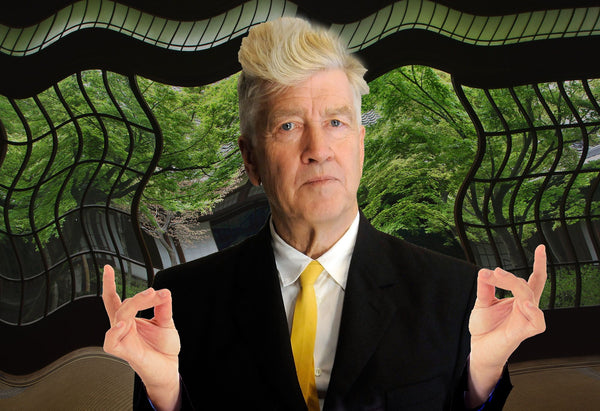David Lynch's Philosophy | The Swila Take
_______________________________________

Found on film sets holding a megaphone, even if you’re only two feet away, David Lynch, often described as a “boy scout,” is the perfect example of a true artist. Born and raised in a small town in Montana, David is a filmmaker, a painter, a musician, an actor, and even a woodworker. His creativity is unbounded and he allows his imagination to extend to infinity. Giving us the gifts of Twin Peaks, Eraserhead, Blue Velvet, The Elephant Man, Lost Highway, Mullholland Drive, and much more, he is a visionary in the deepest sense of the word.

I find that creators like Lynch tend to be polarizing figures. That being said, people either love him or they hate him. However, I would argue that the main reason some people don’t like his work is due to misunderstanding. Here’s why:
Lynch’s work is incredibly vulnerable. But, not the way you might think. It is not an emotional vulnerability that he employs, rather vulnerability of the mind. He opens up his mind and lets the deepest ideas come out and become something magical on the screen. There is an element of controlled chaos and intentional unpredictability in his work. When watching on a surface level, these nuances are just bizarre, even uncomfortable at times. But if you watch, free of judgment, you can see how he isn’t accidentally writing confusing or awkward scenes, rather his work is precisely stylized and incredibly evocative.

The best way to put it is that his films have the logic of a dream. Through lighting, cinematography, dialogue, action, and setting there is an aura of haziness and a slight deviation from reality that exists throughout every one of Lynch’s films. He has said that he particularly likes the mystery genre because life is a mystery, and thus the genre serves as a metaphor for life. In tandem with the mystery, thrill, and suspense, the surreal tone on which the films are built is exacerbated to the point where, sometimes, the oddness can become simultaneously mind-bending and breathtaking. Other times, it’s so strange, all you can do is laugh. This strange hybrid comedy-mystery-oddity is truly the work of a genius...a mad genius.
One of my favorite lines of all time is in Twin Peaks when Gordon Cole says to Agent Dale Cooper, “Coop, you remind me today of a small Mexican chihuahua”. If you’re curious about the context...so are the people watching it. These kinds of random thoughts and ideas will appear in Lynch’s work like thoughts popping into your head. It’s like the speech includes parentheticals.

Another example of this style is in an episode of Louie that Lynch guest-starred in. The line is “here’s the thing with that champ, that’s short for champion, if you want to be a talk show host...”. You can almost read the parenthetical in the language as he speaks it, “here’s the thing with that champ (that’s short for champion).” In some ways these little snippets of information are unnecessary, but in other ways, Lynch’s films wouldn’t be special without them. He is a master of reflecting the human experience in its most unpredictable, side-tracked, yet real, and beautiful form.
Perhaps even more eccentric than his art, is David Lynch’s process of ideation, a process that he credits to transcendental meditation, cigarettes, coffee, and chocolate milkshakes from Bob’s Big Boy. To say he is a creature of habit, would be an understatement. Ever since he discovered transcendental meditation, he hasn’t missed a single session, twice a day. And, every single day at 2:30 pm, for seven years straight, he would go to Bob’s Big Boy, get a silver goblet chocolate milkshake, a cup of coffee, and write ideas on napkins as if he were sitting in his office. His philosophy being, that if these parts of his day are accounted for, they become like muscle memory. He doesn’t even need to think about where he’s going to be at 2:30 pm on any given day, or in the morning or evening when he’s practicing his meditations. And, by allotting himself several periods in his day where his brain is on autopilot, he is freeing his mind up to a deeper and much more enriching level of creativity and imagination. And it is in these pools of imagination that he can go fishing for ideas.
The philosophy is, you must sit quietly as if you are fishing. Be still, be patient, and eventually an idea will bite. And it will strike you like a bolt of electricity coursing through your veins. This idea, whether big or small, comes into the world like a living, breathing entity. It comes into the world wanting to be something, wanting to mold and shape and shift into something greater. Thus one spark of an idea can set off a wildfire of inspiration and vision, waiting for you to make it a reality.

A rare quality that David Lynch has, one which many Hollywood greats lack, is his willingness to share openly on the struggles of being human. Oftentimes, we hear sentiments and philosophies like the latter, and it appears as if these creators are a different species. Some mystical creature that is gifted ideas from beyond, and with the snap of a finger they become a success. But that is not David Lynch.
Prior to his adoption of transcendental meditation practices and the philosophy of stillness and acceptance of the things we cannot control, David Lynch was a depressed, anxious, struggling artist. He said, “At first I had no interest in it [transcendental meditation]. I just wanted to work. But then I must have heard this phrase ‘true happiness is not out there. True happiness lies within’. But they don’t tell you where the within is, and they don’t tell you how to get there.” It took him a while to convince himself that sometimes working yourself to the ground, burning yourself out, and stressing about things that are out of your control isn’t actually an efficient way to get where you want to go.
Now, I’m not understating the power of hard work and grit, but there is something to be said for peace, quiet, and stillness. Stillness of the mind and body. Allowing the negative energy to drift away like clouds on a windy day. Freeing yourself of negative self-talk, stress, “writer’s block”, any myriad of fatalistic mindsets we can talk ourselves into, opens you up to a well of creativity. The more you let go of what you can’t control, the deeper that well gets. And the longer you wait, the more patience you have with yourself, the more ideas you can catch out of the water.

I leave you with this challenge...
Take some time to sit in the stillness. Let your fears and anxieties wash away with your deep inhales and exhales. See what fish are swimming, and see what ideas you can catch when you free yourself of expectations. Be no one but your own authentic self. Sit with yourself, just you and your mind. You’d be surprised what ideas and dreams you will conjure.
Always be writing.
Dream bid.
Tell better stories.
Never give up.

________________________________________
Make sure to leave a comment with your thoughts and ideas. And let us know who's philosophy we should explore next.


Thanks Hannah, I just started reading these blogs and I realised that I just finished all of the. The David Lynch one is especially magnificent as you rightfully put about how Mr. Lynch oftens potrays the struggle of being human. Mulholland Drive is my favourite movie of all time and I love it how you put this baffling philosophy in layman language. Kudos.
Love this. I still remember the first time I saw Mulholland Drive. It pushed me into the abstract and contemplative realm of filmmaking that I will now never return from!
Leave a comment